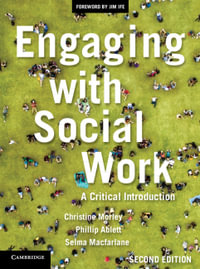In recent decades, the issue of gender-based violence has become heavily politicized in India. Yet, Indian law enforcement personnel continue to be biased against women and overburdened. In Capable Women, Incapable States, Poulami Roychowdhury asks how women claim rights within these conditions. Through long term ethnography, she provides an in-depth lens on rights negotiations in the world's largest democracy, detailing their social and political effects. Roychowdhury finds that women interact with the law not by following legal procedure or abiding by the rules, but by deploying collective threats and doing the work of the state themselves. And they behave this way because law enforcement personnel do not protect women from harm but do allow women to take the law into their own hands.These negotiations do not enhance legal enforcement. Instead, they create a space where capable women can extract concessions outside the law, all while shouldering a new burden of labor and risk.
A unique theory of gender inequality and governance, Capable Women, Incapable States forces us to rethink the effects of rights activism across large parts of the world where political mobilization confronts negligent criminal justice systems.
Industry Reviews
"The importance of the topic, the well-designed and well-conducted research, and Roychowdhury's insightful analyses of the complicated issues surrounding legal reforms, violence, and implementation of rights in the twenty-first century make Capable Women, Incapable States a valuable and very useful book for scholars and students of gender, law, and states...Capable Women, Incapable States will be an excellent way to start conver- sations with
students, especially in courses on law, gender, feminist legal theory, and human rights, and will motivate further research in this area." -- Tugce Ellialti-Kose, Feminist Legal Studies
"brilliant, pathbreaking work ... apable Women, Incapable States is a tour de force, an analysis of the state from multiple perspectives that should influence a new generation of legal andpolitical scholarship" -- Joya Misra, American Journal of Sociology
"...it is the subjective shift Roychowdhury documents when women learn that the law is a strategic field open to them to engage with and manipulate that proves the most enduring lesson. These women's recognition that the legal system can be strategically navigated as a way to claim rights is perhaps the strongest justification for developing 'capability'. In doing so, Roychowdhury presents a clear case for why rights continue to matter even in the face of
incapable systems of justice." -- Chelsea Wallis, BCL Candidate, Univeristy of Oxford, Frontiers of Socio-Legal Studies
"Capable Women, Incapable States meticulously takes you through the struggles of domestic violence victims as they seek redress from a weak and low capacity Indian state, learning to play the system, leverage allies, make the most of the accommodations, and in the process build their capabilities as citizens. Roychowdhury weaves together a narrative of women's situated agency that is as empirically rich and compelling as it is theoretically powerful.
For anyone who cares about gender justice, how the law works and how rights have to be seized to make them work, this is the book for you." -Patrick Heller, Lyn Crost Professor of Social Sciences, Brown
University
"Roychowdhury has authored one of the most original, richly-documented works on gender and states to appear in a long time. Her work brilliantly examines how civil society actors are left to struggle among themselves, leaving state officials 'off the hook.' This exposes those who suffer abuse to deal with risk on their own or, fascinatingly, to activate their ties to grassroots organizations, which may carry out what might otherwise be state functions, such as
punishing domestic abusers. Roychowdhury's subtle analysis of relationships among state officials at all levels of government and various civil society groups puts her work at the forefront of
scholarship on states--their capacities, their boundaries with the 'private,' and potentials for transformation. Her work should inaugurate a new wave of scholarship on politics in the broad range of cases in which state capacities cannot be taken for granted." -Ann Shola Orloff, Northwestern University
"How does Amartya Sen's notion of 'capabilities' play out on the ground, as ordinary women negotiate the law, the state, the police and the family in contexts of domestic violence? Roychowdhury's deep and thorough research in Bengal reveals the limitations as well as the possibilities of engaging with questions of capabilities in relation to women's rights and empowerment, and the masculinities of the law and the state in India. This is an illuminating and
important contribution to the study of gender and violence and post-development thought." -Inderpal Grewal, Professor Emerita, Yale University
"Poignant, insightful, surprising and analytical, Poulami Roychowdhury's book beautifully illuminates how, far from being an issue within a home, domestic violence implicates the world in which homes are embedded: neighborhoods, fictive kin, local political interests, and multiple levels of the state. It shows how, in highly unequal conditions, survivors of domestic violence must transform themselves into capable women rather than victims in order to claim
their rights. In so doing, the survivors take on the work of very state which continues to fail them." -Raka Ray, Dean of the Division of Social Sciences, and Professor of Sociology and South Asian
Studies, University of California, Berkeley
"This book is a must read for scholars and activists, especially those who are interested in deepening their understanding of gender-based violence, women's empowerment, and agency in the context of the state and its political, administrative, and legal systems and mechanisms. The book provides a first-hand account of violence and women's journeys through risky and labourious paths for claiming justice." -- Rajib Nandi, Pacific A!airs: Volume 97
























